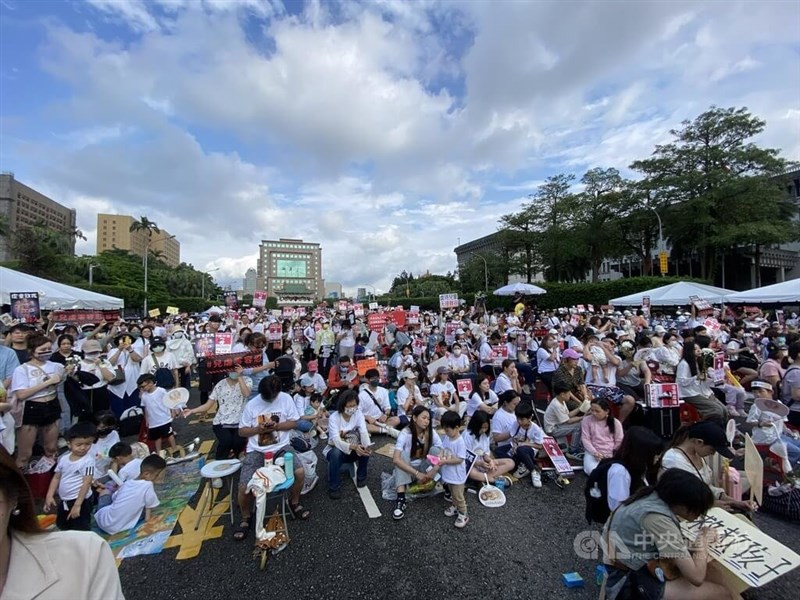In a powerful display of public concern, over 10,000 people gathered on Ketagalan Boulevard in front of Taiwan’s Presidential Office on Saturday, May 10, 2025, demanding urgent and systemic reforms to Taiwan’s child protection laws. The rally, driven by a deep national mourning for “Kai Kai” (剴剴)—a 1-year-old boy who tragically died in foster care due to alleged abuse—has become a turning point in Taiwan’s child welfare discourse.
The event was organized by the Kai-Kai Online Moms Group, a grassroots collective of parents and child welfare advocates that rose to prominence following Kai Kai’s death in December 2023. The group is pushing for what they say is long overdue: a dedicated national child protection agency, robust legal reforms, and multi-agency coordination to prevent such tragedies from happening again.
🔍 Background: Who Was Kai Kai and What Happened?
Kai Kai was placed in foster care under Taiwan’s official child welfare system in August 2023 with Liu Tsai-hsuan (劉彩萱), a certified caregiver, and her sister Liu Juo-lin (劉若琳). By December, he had died, allegedly due to repeated abuse. His case shocked the nation—not only because of the brutality involved but because it exposed serious flaws in Taiwan’s foster care oversight, including insufficient monitoring, unvetted caregivers, and unclear accountability between agencies.
The two caregivers were indicted and are currently on trial in Taipei District Court, with a verdict expected on May 13, 2025.
💬 Voices from the Ground
Wearing white t-shirts and carrying white chrysanthemums—a symbol of mourning—rally participants chanted slogans such as “Protect Children” and “Zero Tolerance for Child Abuse.” Emotions ran high as parents, activists, and even local celebrities, including Taipei 101 Chairperson Janet Chia (賈永婕), joined the cause.
Lee Yu-chun (李侑宭), the chairperson of the Moms Group, made several key proposals at the rally:
- The creation of a centralized child protection agency, modeled after South Korea’s system, with authority to oversee and coordinate the work of prosecutors, police, and welfare departments.
- The appointment of dedicated pediatricians to partner with social services and legal institutions in detecting and responding to abuse.
- An amendment to the Criminal Code to eliminate parole for child abuse cases resulting in death if the sentence is life imprisonment or capital punishment.
The group also submitted 84,467 petition letters to various government agencies.
🏛️ Government Response and Policy Lag
In response to the groundswell of public outrage, the Ministry of Health and Welfare (MOHW) issued a statement acknowledging the need for reform. Chang Hsiu-yuan (張秀鴛), head of MOHW’s Department of Protective Services, confirmed plans to establish a dedicated “child and youth affairs unit”. However, the proposal remains vague with no firm structure, timeline, or legal mandate announced—a point that continues to draw criticism from advocacy groups.
Experts argue Taiwan’s decentralized child protection system suffers from a lack of national coordination, underfunding, and a culture of bureaucratic risk aversion. Social workers are often overloaded and undertrained in abuse detection, making children vulnerable to falling through the cracks.
🧠 Original Insight: A Systemic Failure in the Making
This tragedy is not isolated. Experts warn that Taiwan’s rapid urbanization, combined with shifting family dynamics, has increased the number of children in foster care, yet welfare systems have not evolved proportionally. Meanwhile, frontline workers lack consistent training, and data sharing between agencies remains inefficient.
Scholars point to South Korea and Norway as models. These countries maintain centralized child protection offices that work across legal, medical, and social fields. Taiwan, by contrast, still functions with fragmented authority, where no one agency has final accountability.
The rally signals that Taiwanese civil society is now demanding not just justice for Kai Kai—but a national transformation in how children are protected.
📌 FAQs
What prompted the recent child protection rally in Taipei?
The rally was triggered by the death of a 1-year-old boy, Kai Kai, due to suspected abuse in foster care. Protesters are demanding systemic reform and harsher penalties for child abusers.
Who organized the protest?
The Kai-Kai Online Moms Group, a grassroots organization of concerned parents and citizens advocating for children’s rights.
What are the group’s main demands?
A centralized child protection agency, legal reforms to deny parole in severe abuse cases, involvement of medical professionals in abuse detection, and better coordination between agencies.
Has the government responded?
Yes, the Ministry of Health and Welfare announced plans to form a child and youth affairs unit, but details are still under discussion.
What’s the legal status of the caregivers involved in Kai Kai’s death?
They have been indicted and are awaiting a verdict from the Taipei District Court, expected on May 13, 2025.


